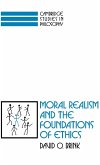This important book brings recent findings and theories in biology and psychology to bear on the fundamental question in ethics of what it means to behave morally. It explains how we acquire and put to work our capacities to act morally and how these capacities are reliable means to achieving true moral beliefs, proper moral motivations, and successful moral actions. By presenting a complete model of moral agency based on contemporary evolutionary theory, developmental biology and psychology, and social cognitive theory, the book offers a unique perspective. It will be read with profit by a broad swathe of philosophers, as well as psychologists and biologists.
Table of contents:
Part I. Moral Agency and Scientific Naturalism: 1. Understanding moral agency: what is a scientific naturalist view of moral agency?; Part II. The Biological Bases of Moral Agency: 2. Evolution and moral agency: can evolution endow us with moral capacities?; 3. Evolution and moral agency: Does Evolution endow us with moral capacities?; 4. Developmental biology and psychology and moral agency: how do our biologically-based moral capacities develop?; Part III. The Psychological Bases of moral Agency: 5. Behavioral psychology and moral agency: how do we learn to behave morally?; 6. Social cognitive psychology and moral agency: how do we learn to act morally?; 7. The neurophysiological bases of moral capacities: do the neurosciences have room for moral agents?; Part IV. A Scientific Naturalist Account of Moral Agency: 8. The adequacy of moral beliefs, motivations and actions: how can biological and psychological explanations serve as justifications?; 9. Moral ontology: what is the ontological status of moral values?; Part V. Integrating a Personalistic and Naturalistic View of Agency: 10. The manifest and scientific images of morality: how can we integrate our ordinary and scientifically based views of moral agency?
This important book brings recent findings and theories in biology and psychology to bear on the fundamental question in ethics of what it means to behave morally. It will be read with profit by a broad swathe of philosophers, as well as psychologists and biologists.
Brings recent findings and theories in biology and psychology to bear on ethics.
Hinweis: Dieser Artikel kann nur an eine deutsche Lieferadresse ausgeliefert werden.
Table of contents:
Part I. Moral Agency and Scientific Naturalism: 1. Understanding moral agency: what is a scientific naturalist view of moral agency?; Part II. The Biological Bases of Moral Agency: 2. Evolution and moral agency: can evolution endow us with moral capacities?; 3. Evolution and moral agency: Does Evolution endow us with moral capacities?; 4. Developmental biology and psychology and moral agency: how do our biologically-based moral capacities develop?; Part III. The Psychological Bases of moral Agency: 5. Behavioral psychology and moral agency: how do we learn to behave morally?; 6. Social cognitive psychology and moral agency: how do we learn to act morally?; 7. The neurophysiological bases of moral capacities: do the neurosciences have room for moral agents?; Part IV. A Scientific Naturalist Account of Moral Agency: 8. The adequacy of moral beliefs, motivations and actions: how can biological and psychological explanations serve as justifications?; 9. Moral ontology: what is the ontological status of moral values?; Part V. Integrating a Personalistic and Naturalistic View of Agency: 10. The manifest and scientific images of morality: how can we integrate our ordinary and scientifically based views of moral agency?
This important book brings recent findings and theories in biology and psychology to bear on the fundamental question in ethics of what it means to behave morally. It will be read with profit by a broad swathe of philosophers, as well as psychologists and biologists.
Brings recent findings and theories in biology and psychology to bear on ethics.
Hinweis: Dieser Artikel kann nur an eine deutsche Lieferadresse ausgeliefert werden.







